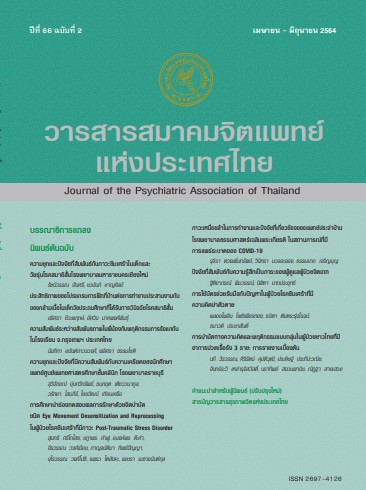Burnout and Related Factor among Residents of Thammasat University Hospital In the COVID-19 outbreak
Main Article Content
Abstract
Objective: This study aims to assess the prevalence of burnout syndrome and related factors among Residents of Thammasat University Hospital.
Method: This was a cross-sectional designed study, which included all residents in Thammasat University Hospital; from April to June 2020. Online questionnaire was used. The questionnaire comprised of 4 parts: 1) demographic data 2) work-related questionnaire 3) COVID-19 work-related questionnaire 4) Maslach burnout inventory (MBI) Thai version. Using descriptive statistics to describe the demographic data, work-related, COVID-19 work-related and burnout syndrome. The factors associated with burnout syndrome score were analyzed by using multiple linear regression.
Result: Responses were obtained from 67 residents (response rate of 26.17%), They were male 38 participants (56.72%). The average duty time was 84.87 hours/weeks. They report insufficient of sleep hours (59.70%) and used to thought of resign from training (58.21%). Most of them used to work on COVID-19 related job. Residents have high level of emotional exhaustion 50.74%, high level of depersonalization 38.81% and a high reduced personal accomplishment 0%. Result of multiple linear regression analysis showed factors related to emotional exhaustion were working hours, insufficient of sleep hours , insufficient of advisor and used to thought of resign from training. Depersonalization was associate with insufficient of advisor. For personal accomplishment, it related with conflict in work place.
Conclusion: This study shows, the most of residents have high emotional exhaustion. Many factors were related. Reduced or appropriate management of associated factor lead to decreasing burnout syndromes.
Article Details
Articles submitted for consideration must not have been previously published or accepted for publication in any other journal, and must not be under review by any other journal.
References
2. Maslach C. Burnout: A multidimensional perspective. Professional burnout: Routledge; 2017. p. 19-32.
3. IsHak WW, Lederer S, Mandili C, Nikravesh R, Seligman L, Vasa M, et al. Burnout during residency training: a literature review. Journal of Graduate Medical Education. 2009;1(2):236-42.
4. Bangal V. Burnout during residency and role of residency co-ordinator. J MGIMS.
5. ICD-11 for Mortality and Morbidity Statistics (Version : 04 / 2019) [Internet]. World Health Organization. 2019 [cited 2019 June 28]. Available from: https://icd.who.int/browse11/l-m/en#/http://id.who.int/icd/entity/129180281.
6. Melamed S, Shirom A, Toker S, Berliner S, Shapira I. Burnout and risk of cardiovascular disease: Evidence, possible causal paths, and promising research directions. Psychological Bulletin. 2006;132(3):327.
7. Maslach C, Schaufeli WB, Leiter MP. Job Burnout. Annu Rev Psychol 2001; 52:397-422.
8. Titawee K. The Prevalence and Associated Factors of Depression among Residents in Training at Faculty of Medicine, Siriraj Hospital. J Psychiatr Assoc Thailand. 2014;59(1):41-50.
9. Ogundipe OA, Olagunju AT, Lasebikan VO, Coker AO. Burnout among doctors in residency training in a tertiary hospital. Asian J Psychiatr. 2014;10:27-32.
10. Rodrigues H, Cobucci R, Oliveira A, Cabral JV, Medeiros L, Gurgel K, et al. Burnout syndrome among medical residents: A systematic review and meta-analysis. PloS one. 2018;13(11):e0206840.
11. Srikam S. Job Burnout and Related Factors among Residents of King Chulalongkorn Memorial Hospital [thesis]. Bangkok: Chulalongkorn University; 2013.
12. Thamrongvisava, S., & Pitanupong, J. (2018). The Prevalence and Associated Factors of Burnout Syndrome among Residents in Training at Faculty of Medicine, Songklanagarind Hospital. Journal of The Psychiatric Association of Thailand, 63(4), 309-320.
13. Martini S, Arfken CL, Churchill A, Balon R. Burnout comparison among residents in different medical specialties. Academic psychiatry. 2004;28(3):240-2.
14. Holmes EG, Connolly A, Putnam KT, Penaskovic KM, Denniston CR, Clark LH, et al. Taking care of our own: a multispecialty study of resident and program director perspectives on contributors to burnout and potential interventions. Academic Psychiatry. 2017;41(2):159-66.
15. Gelfand DV, Podnos YD, Carmichael JC, Saltzman DJ, Wilson SE, Williams RA. Effect of the 80-hour workweek on resident burnout. Arch Surg. 2004;139(9):933-8; discussion 8-40.
16. Xiang Y-T, Yang Y, Li W, Zhang L, Zhang Q, Cheung T, et al. Timely mental health care for the 2019 novel coronavirus outbreak is urgently needed. The Lancet Psychiatry. 2020;7(3):228-9.
17. Marjanovic Z, Greenglass ER, Coffey S. The relevance of psychosocial variables and working conditions in predicting nurses’ coping strategies during the SARS crisis: an online questionnaire survey. International Journal of Nursing Studies. 2007;44(6):991-8.C4
18. Maunder RG, Lancee WJ, Balderson KE, Bennett JP, Borgundvaag B, Evans S, et al. Long-term psychological and occupational effects of providing hospital healthcare during SARS outbreak. Emerging Infectious Diseases. 2006;12(12):1924.
19. Kim JS, Choi JS. Factors influencing emergency nurses' burnout during an outbreak of Middle East Respiratory Syndrome Coronavirus in Korea. Asian Nursing Research. 2016;10(4):295-9.
20. Golub JS, Weiss PS, Ramesh AK, Ossoff RH, III MMJ. Burnout in Residents of Otolaryngology-Head and Neck Surgery: A National Inquiry into the Health of Residency Training. Acad Med 2007; 82:596-601.
21. Dahn H, McGibbon A, Bowes D. Burnout and Resiliency in Canadian Oncology Residents: A Nationwide Resident and Program Director Survey. Pract Radiat Oncol. 2019;9(1):e118-e125.
22. Eckleberry-Hunt J, Lick D, Boura J, Hunt R, Balasubramaniam M, Mulhem E, Fisher C. An exploratory study of resident burnout and wellness. Acad Med. 2009;84(2):269-77.

